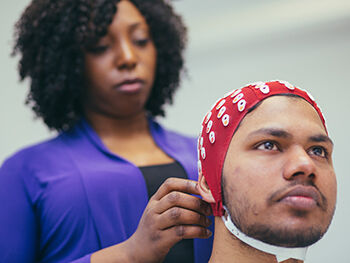University News Last updated 01 June 2018

You may have heard the phrase “social sciences” thrown around a lot, in relation to subjects like criminology, psychology and sociology, without really knowing what it means. At a university level, it isn’t as straightforward as “business”, “art” or “engineering” are to understand.
So we asked the School of Social Sciences here at Birmingham City University to break it down, first by looking at the phrase itself, before explaining the three subjects we teach here.
Social Sciences
The phrase “social science” is very broad. Every university has a different collection of subjects that they group together under the social science banner. This can include anthropology, economics, history, political science, and even law!
Social Sciences basically means the study of a certain aspect or aspects of human society. The subjects involved tend to be more theoretically based than the likes of engineering, broadcasting or nursing, but that doesn’t mean that they don’t include practical aspects. All three of the schools at Birmingham City University, Criminology, Psychology and Sociology, put an emphasis on putting the theory into practice.
Criminology
 What is it?
What is it?
Criminology is the study of crime and its causes.
What topics does it cover?
- Crime Media
- Crime Prevention and Rehabilitation
- Criminal Law
- Cyber Crime
- Forensics
- Hate Crime
- History of Crime
- Homicide
- Policing
- Prisons and Punishment
- Rehabilitation
- Security and Surveillance
What careers can it lead to?
A Criminology degree can lead to jobs in the policing and security sectors. An in-depth knowledge of the history and theories behind crime can be invaluable for police officers and security professionals.
The degree also could open up doors in the health sector, as someone involved with the rehabilitation side of crime (which can include youth work), or as someone who helps prisoners reintegrate into society.
With further training, a Criminology degree can also form the foundations of a forensics or legal career.
Psychology
 What is it?
What is it?
Psychology is the study of the mind and its processes, both on an individual and societal level.
What topics does it cover?
- Communication and Language
- Counselling
- Cyber Psychology
- Educational Psychology
- Health Psychology
- Mental Health
- Neuropsychology
- Occupational Psychology
- Parapsychology
- Psychopathology
- Social Psychology
What careers can it lead to?
While a Psychology degree can obviously lead on to a career as a psychologist, it is a lot more flexible than that. Psychology is prominent in a lot of areas of life, from crime and justice to health and education.
Understanding the psychology behind why people commit crimes can aid you in a career in the justice or legal sectors.
Health psychology is an exciting field of research which makes medical breakthroughs regularly. And the same can be said for educational psychology, which enables better standards of teaching.
Sociology
 What is it?
What is it?
Sociology is the study of society.
What topics does it cover?
- Activism, Social Movements and Social Change
- Community and Culture
- Globalisation
- Identity
- Popular Culture
- Public Sociology
- Race, Racism and Ethnicity
- Social Life
- Youth Socialisation
What careers can it lead to?
Sociology is a valuable degree for anyone interested in using their critical thinking and analytical skills for a career which engages with the problems covered by the topics above. You could find yourself working in the fields of government or politics, or alternatively working for community based organisations, charities or non-governmental organisations (NGOs).
Sociology is also an ideal degree for those looking to get into social work, both in the health sector or in government. Those looking for one-to-one jobs can explore careers in youth work, family support and as an advice worker.
Governmental and third sector roles range from working as a development worker for a local community or taking on a role as an aid worker for a charity overseas. This highly flexible degree can also lead to a variety of other careers, centred around helping to build a better society for everybody.